Use controls above or click here to open this Hometown Heroes podcast in a new window
104-year-old Jack Perrin of Santa Barbara, CA appears on episode #638 of Hometown Heroes, airing July 23-27, 2020. Perrin remembers his secret intelligence work with the Navy during World War II, contributing to significant Allied success, including the pivotal victory in the Battle of Midway.
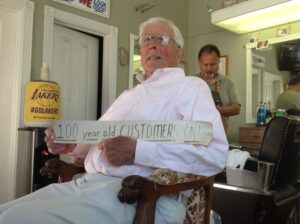
Listen to Hometown Heroes for Jack’s joking response to the question of what his secret for staying so sharp and engaged at age 104 is, as well what he takes the most pride in after more than a century of living. You’ll hear Jack share how a trip to the Los Angeles Coliseum for a UCLA vs. USC football game provided the inspiration for the successful company that he would someday lead. He was in the men’s room with his stepfather, Jay Perrin, when an unfortunate mess strewn about the bathroom caused an idea to germinate in Jay’s mind.
“Somebody, naturally, pulls it down, the whole thing goes on the floor,” you’ll hear him recall of the stack of paper towels for drying hands. “That’s when he invented the paper towel dispenser.”
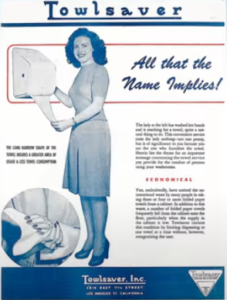
Over the years that followed, Jack had a front row seat as Jay sought out patents, funding, and distribution for his invention, which became the foundation of Towlsaver, Inc. While a student at Fairfax HS in Los Angeles, Jack would spend his weekends fixing up dispensers that had malfunctioned. After graduating from high school, Jack was accepted to Stanford University, but chose UCLA instead, largely because it was more affordable. His Zeta Psi fraternity included two sons of actor Joe E. Brown, and even, for a brief time, Joe E. Brown himself. You’ll hear Jack explain how that happened, in addition to recalling his time on the Bruin football and track & field squads, with his teammates including Jackie Robinson, Kenny Washington, and Woodrow Strode.
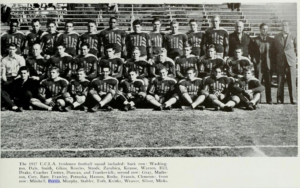
Robinson served in the Army in World War II before breaking Major League Baseball’s color barrier. A football injury prevented Washington from serving in the war, but he and Strode, an Army Air Corps veteran, helped integrate the National Football League. Jack Perrin’s military service would come in the Navy, but his first experience in uniform led to an embarrassing moment. His commission came through while he was working at Aetna insurance in Philadelphia. Before reporting for duty, he flew to Las Vegas to get married, wearing the Navy uniform he had just purchased.
“I got off the plane, there was a guard there with a rifle and bayonet and everything, and he was saluting me,” you’ll hear Jack recall. “I didn’t know how to salute. I just said hi, and didn’t salute.”
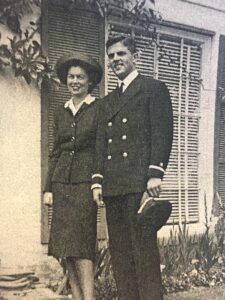
He never had that trouble again. Jack and his bride, Lorraine, enjoyed a ten-day honeymoon in San Francisco, interrupted each morning when Jack had to report to the Navy office, bags packed, in case his orders had arrived. When that finally happened, Jack was sent to Hawaii, and it would be two-and-a-half years before he’d get to see his wife again. Lorraine supported the war effort by working at Douglas Aircraft in Santa Monica, while Jack’s contributions were shrouded in secrecy. His journey from San Francisco to Honolulu aboard the USS Talamanca (AF-15), a converted fruit hauler, introduced him to the world of coded communications.
“We’d get messages from other people,” you’ll hear Perrin explain. “I would help them to decipher them and put them into English.”
After initial training and some investigative work geared toward vetting potential sympathizers to the cause of Imperial Japan, Jack was assigned to the Combat Intelligence Unit, also known as Station HYPO, or as he and his friends came to call it, “the dungeon.” You’ll hear him describe a sort of “secret passageway” to access their outpost in the basement of the administrative building at Pearl Harbor.
“Kind of a dungeon place, with a special guard and all that,” Perrin remembers. “It was where they were reading the Japanese code, so it was obviously a very secretive place.”
Jack was one of ten officers, alongside thirteen enlisted men, all serving at HYPO under the leadership of Joseph Rochefort. Several sailors who had been bandsmen on the battleship USS Maryland, which had been damaged in the attack on Pearl Harbor, operated IBM punch card machines in the “dungeon” to help process the information. When intercepted Japanese messages yielded actionable information, Jack would relay that info to the proper entities, often submarines that would then know exactly where and when to find enemy convoys to attack. He held the men he worked with in high regard, especially Joseph Rochefort.
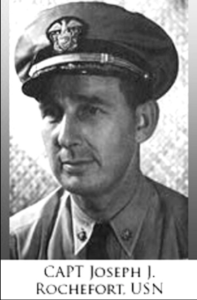
“He lived there, knew the language, knew the people, knew the customs,” he says of Rochefort’s pre-war time in Japan. “He was a wonderful skipper.”
One of the hallmark achievements for Rochefort and HYPO came in baiting the Japanese into intimating their intent to attack American forces at Midway Island. In an effort to identify which potential U.S. target had been referred to in encoded Japanese communication as “A.F.,” a plain language message was broadcast, pretending that the desalination equipment at Midway had failed. The ploy was effective, as HYPO soon intercepted a Japanese transmission referring to a water problem at “A.F.” Rochefort convinced Admiral Chester Nimitz to send his carriers to Midway, where the element of surprise then belonged to the Americans instead of Japan. The pivotal Allied victory that followed was a direct result of the intelligence gleaned by the cryptanalysts at HYPO.
Another noteworthy contribution from Jack and the codebreakers in the “dungeon” came in April, 1943, when they were able to pinpoint the plans of Admiral Isoroku Yamamoto, commander of all Japanese Naval forces. Jack had the privilege of sending out the message containing Yamamoto’s itinerary. It was received by the 339th Fighter Squadron at Henderson Field on Guadalcanal, where 16 P-38 Lightnings took off on their long range mission to intercept Yamamoto’s plane and shoot it down. Learn more about how it all unfolded in Don Holloway’s article Death By P-38.
“It was exciting and you knew you were doing something very constructive,” you’ll hear Jack Perrin say of his secret work at HYPO. “The Japanese had no idea we were breaking their code.”
After more than two years at HYPO, Jack was transferred to an intelligence outpost in Washington, D.C., which allowed him to reunite with Lorraine. Even though they had been married for more than 900 days, they had only spent ten days together as a married couple. She joined him in Washington, and they spent the evening of V-J Day celebrating with a large crowd in front of the White House. The Navy offered Jack a promotion to Lieutenant Commander, but he opted instead for the Naval Reserve and a return to California to work for Towlsaver.
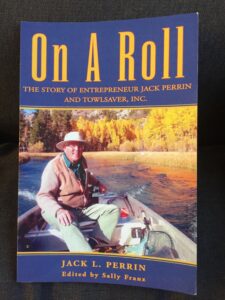
He would eventually succeed his dad as president of the company, but one of Jack’s early successes came when he resurrected a pre-war dispenser design, creating a new model, the C-5, that would really take off.
“You used to have to lift the lever and turn the crank,” you’ll hear him explain. “I changed it around where you didn’t do that. You just start to jiggle it, and it’ll turn.”
Listen to Hometown Heroes for an example of how Jack turned a perceived liability of the C-5 into an asset, as well as a unique location where one of the original Towlsaver models is still in use. Perrin’s book, On a Roll, details the ups and downs as he enlarged the footprint of the company, eventually distributing towels and dispensers throughout the United States. He and Lorraine raised three children, and enjoyed 34 years of marriage before cancer claimed her life in 1976. Towlsaver, Inc. was sold in 1980 for $10 million, but Crown Zellerbach, the buyer, had no desire to get into the production realm of the business. Jack held onto the plant that pumped out the dispensers, and formed Perrin Manufacturing Company to continue supplying that need. His son, Pat, eventually became the CEO of Perrin Manufacturing, guiding the company through the transition to “hands free” towel dispensers.
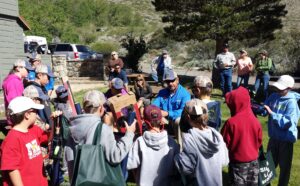
When asked what he’s most proud of throughout his 104 years, you’ll hear Jack point to the Silver Lake Fly Fishing Academy that he founded and continues to support. It’s a free opportunity for children to learn the art of fly fishing, and thanks to the generosity of the Perrin family, the kids are outfitted with all of the gear they need to succeed.
“I wanted to teach the kids how to fly fish,” you’ll hear Perrin explain. “It’s my baby. I started it, and I just love it.”
Silver Lake is a trout fishing retreat in California’s Mono County, on the eastern slope of the Sierra Nevada. It has long been a favorite escape for Jack and his wife of 44 years, Katherine. On one May day in 2013, however, Silver Lake was the site of a major scare for both of them.
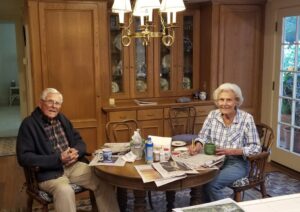
Listen to Hometown Heroes for the story of how Jack’s fishing boat capsized, how close the then 97-year-old came to perishing that day, and the role Katherine played in ensuring that both Jack and his fishing partner survived. That fishing partner was Dr. Don Goffinet, who courageously risked his own life to save Jack, to whom he refers as “probably the best man that I’ve ever known.” In addition to Dr. Goffinet, you’ll hear from Jack’s son, Dr. Tim Perrin, who came to understand his father’s WWII service in a deeper way when he accompanied his dad to the 2019 feature film, MIDWAY.
“What I appreciate about having my dad around at 104 is being able to see history as relevant,” you’ll hear Dr. Perrin share. “It really is relevant. It really did happen. It wasn’t just a story.”
Special thanks to loyal Hometown Heroes listeners Mike and Linda Herber for letting us know about Jack Perrin and his unique legacy.
—Paul Loeffler

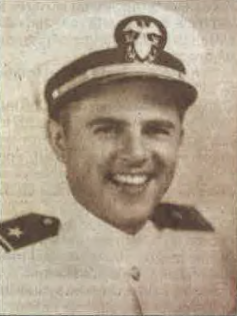
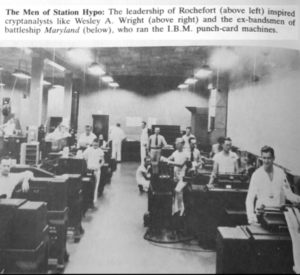
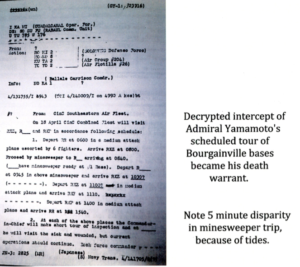
Leave a Reply